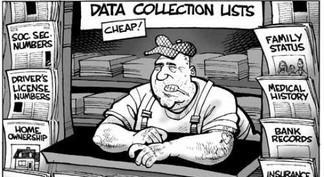Menu
Facebook's latest shenanigans
|

You know Facebook makes its money by collecting, analyzing, reusing, and selling the personal information it collects about its "customers." Now you know Facebook has gone a big step further by manipulating the news feeds of hundreds of thousands of people to make them feel good or bad.
Facebook data scientist Adam Kramer issued an apology the day after news of the May 2012 experiment was released. Slate's David Auerbach describes "All the other experiments Facebook plans to run on you." Auerbach explains that Facebook claims to live in a "post-consent world," so they don't really need to ask for their guinea pigs' permission beforehand. Julie Angwin's June 17, 2014, article on ProPublica provides a history of Facebook's conflicting claims about who and what it tracks. First the company says it doesn't use the Like button to track you, then it admits that it does. Then Facebook says it doesn't track users after they sign out of their account, then it says it does. Regardless of what Facebook actually does or doesn't do with the personal information of its users, it is abundantly clear that Facebook can't be trusted. By the way, don't think the posts you begin to write but decide against posting are private. In December 2013 Ars Technica's Casey Johnston wrote about two Facebook researchers who collected the statuses that 5 million Facebook users wrote but did not post. One of the two researchers was the Same Adam Kramer who just apologized for using Facebook customers as research subjects without bothering to ask for their permission beforehand. And just for the record, Facebook's terms of service allow the company to use your personal information any way it chooses for "research" purposes. What we have here is a serious failure to communicate. |

Google's Page: Give up privacy so we can save lives
Is protecting your health information worth saving 100,000 lives? That's the question Google co-founder Larry Page poses in a New York Times interview with Farhad Manjoo. Page claims that if Google and other data-mining firms could only access everyone's medical records, the world would be a healthier place. To which Victoria Turk, UK editor of Motherboard, says "Phooey!" Turk points out how inaccurate Google Flu Trends turned out to be. Data miners claim to anonymize the personal data they collect. In fact, it is trivially easy for the data to be un-anonymized. Turk provides the example of a medical condition she has that an insurer, government agency, or other entity would be able to identify quite simply based on only her date of birth, gender, and very little other so-called anonymous information. Do I trust Google? I trust the company to make as much money as it possibly can -- as is its fiduciary duty to its shareholders -- in any legal way possible. The last thing I need is for Google to know even more about me than it knows already. |

Two more reasons why you should be blocking web ads
The online ad networks are out of control. In a June 10, 2014, post I described the findings of a U.S. Senate study into the dangers of online advertising. Ad networks track us across the Internet and share the personal information they collect about us indiscriminately. Even worse, some of the ads they serve on popular sites deliver malware without requiring that we click anything. Simply by opening a page on a site such as ESPN.com our computers or devices can become infected with malware that steals our sensitive financial information, including bank user IDs and passwords. Now researchers are beginning to question whether online ads work at all. The Atlantic's Derek Thompson pointed out in a June 13, 2014, article that Google may "vastly exaggerate" the effectiveness of search ads. Researchers at EBay found that the ads served up by Google based on the term searchers enter have little or no influence on the person's buying decision. Thompson explains why he's skeptical of Facebook's claims about the effectiveness of the ads that appear in people's news feeds, even when people don't actually click the ad. For one thing, can you really trust a company's own uncorroborated claims of how great it is? Then there's the "I was gonna buy it anyway" factor, which researchers refer to as "endogeneity." You can be sure I'll be coming back to this subject in the future. -- Dennis O'Reilly |
